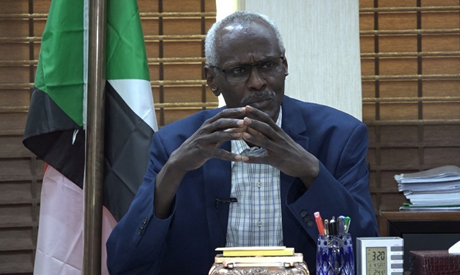
Minister of Irrigation and Water Resources, Professor Yasser Abbas (Photo: suna-sd.net)
Sudan's irrigation minister Yasser Abbas said the potential positive effects of the disputed Grand Ethiopian Renaissance Dam (GERD) on his country could "turn into risks" if agreement is not reached on the first filling and operation of the dam, according to the Sudanese state news agency SUNA.
Ethiopia has repeatedly said it will start filling the reservoir of the $4.8 billion mega-dam in July regardless of whether an agreement is reached with Egypt and Sudan or not.
Addressing the representatives of the Sudanese Central Council of the Forces for Freedom and Change, Abbas confirmed the possibility of damage resulting from the unsafe operation of Sudan’s dams "in case of the lack of coordination and data exchange with the Ethiopian side".
"The GERD could be a gesture of regional cooperation between the three countries in providing energy from Ethiopia, food from Sudan by using its agricultural lands, and the capital and industrial investment from Egypt, with the establishment of a common market to enhance this integration," the Sudanese minister was quoted as saying.
He reiterated Sudan's demand to reach a legally-binding agreement on the issue of filling and operating the Renaissance Dam without disturbing the balance of the distribution of Blue Nile water shares.
The Ethiopian side attempted to include points on the sharing of Nile water in the dam's deal during the latest negotiations, a step that was refused by Cairo and Khartoum as negotiations are related only to the filling and operation of the dam, not the sharing of water quotas between the three countries, according to previous statement by Abbas.
The stand-off between the three African countries came to a head after the breakdown of the recent Sudan-brokered negotiations, held from 9 to 17 June, where Ethiopia refused to enter into a legally binding agreement over the controversial project.
Sudan, as a result, requested the matter be referred to the prime ministers of the three countries to restart the talks and solve the impasse, a proposal Egypt said had been rejected by Ethiopia.
The virtual talks were attended by observers representing the US, EU, and South Africa, the current president of the African Union.
Egypt then asked the United Nation Security Council on Friday to intervene to affirm the importance of the three countries resuming negotiations in good faith to reach a fair and balanced settlement.
The revived Sudanese-mediated negotiations came after three months of deadlock when the United States intervened late in November to broker a deal, but Ethiopia skipped the last round of meetings in February that was due to result in a final accord, and accused Washington of siding with Egypt..
Short link: